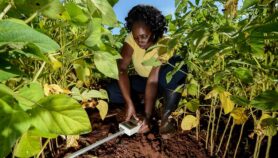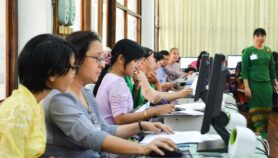Send to a friend
The details you provide on this page will not be used to send unsolicited email, and will not be sold to a 3rd party. See privacy policy.
When it comes to biodiversity information, incentives need to be provided to improve international sharing of data, report Tracy Irvine and Daniela Hirschfield.
A new ‘union’ of international scientific, governmental, nongovernmental and private organisations will share data on biodiversity and ecosystem services on an open source platform, whilst at the same time having their ownership of the data acknowledged, it was announced at the At the Eye on Earth Summit in Abu Dhabi (12–15 December).
Under the biodiversity special initiative that emerged from the four-day Summit on improving environmental information, proprietary data will be tracked as it is shared, so that contributing partners are recognised for the vital data collection work they do.
“The benefit to global sharing is that you add your data into it, it stays on your system, but becomes discoverable and easily consumable by any others for incorporation directly into decision-making, or further analyses,” a paper prepared by the conference working group on biodiversity said.
“Despite significant international efforts to enable and promote data sharing, the systems that do exist are often under-used and lack incentives. This results in decisions based on incomplete information, duplication of monitoring effort, and a high cost to discovery of information and data,” the paper said.
Policy-lagging biodiversity decline
National and international policies have not kept up with the increasing complexity of databanks and the ability to analyse the datasets, so that global biodiversity is declining at a faster rate than conservation efforts based on the data can be put in place.
“Barely 15 per cent of the world’s species is logged in databases today,” Julia Marton-Lefèvre, director general of the International Union for the Conservation of Nature (IUCN) told the conference, adding that it had taken “over 300,000 experts over 1000 years to put them in the catalogue of life”.
But she stressed: “It is not necessary to know everything about all the 8.7 million species living on our planet before we take action.”
“We need to listen to what the data we already have is telling us,” she said, pointing out that 41 per cent of amphibians, 13 per cent of birds, and a quarter of known mammals are in danger of extinction according to the IUCN’s Red List, which she described as a “barometer of life”.
Jon Hutton, director of the United Nations Environment Programme’s World Conservation Monitoring Programme, told the conference the biodiversity special initiative aimed to share the best data on key natural resources to improve decision-making.
“The challenge we face is to create a lot of new data and to unlock what we already have — existing long term data sets are not effectively put to work for the purpose,” said Hutton.
“There are many international organisations with a great deal of information, but we need to bring it together,” he said. “One of the areas the special initiative will work on is ‘harvesting’ more data on the environmental impact of biodiversity decline,” he added.
Partners in the union with include “the main institutions leading global collation and sharing of information and data on biodiversity. Together they manage the majority of existing work and networks”, according to the conference paper.
Large global data sets on biodiversity and ecosystem services are held by a range of scientific, public and private organisations.
They include UNEP; the Convention on Biological Diversity, through the CBD Clearing House Mechanism; the Global Biodiversity Information Facility which provides biodiversity data as a free open access resource through the GBIF partnership; the Convention on International Trade in Endangered Species of Wild Flora and Fauna (CITES); IUCN; Conservation International; NatureServe; and private sector companies undertaking environmental impact assessments.
Incentives
Incentives for sharing data would be provided for organisations that have painstakingly collected biodiversity data over many years, the conference’s working group on biodiversity agreed.
Measures include encouraging governments, funding bodies, and academic and research institutions to reward and require sharing.
Although sharing involves some costs, incentives outlined in the special initiative are not primarily financial but focus more on tools for simplifying data management
Under the data-sharing union being proposed, “you determine to what extent your resources are available to others: for example, it may default to sharing metadata only, but allow public sharing of complete dataset with a single click. You can link and keep track of your existing information and data, complementing existing cataloging tools”, the conference paper said.
Applications
Two application demonstrate the effectiveness of the suggested approach. They are Unlocking EIA (environmental impact assessment) data, and providing data for the Intergovernmental Platform on Biodiversity and Ecosystem Services (IPBES).
The Unlocking EIA project is working with the International Association of Impact Assessment (IAIA), which has published best practice guidelines for the private sector on capturing data in a standardised format.
EIA data sets are already used by government planning authorities for developing infrastructure for biodiversity management.
IPBES is encouraging increased accuracy, dissemination and coverage of biodiversity data as part of the move to include a global inventory of biodiversity and its economic value in the global Green Economy agenda for Rio+20, the United Nations Conference on Sustainable Development in Brazil in June 2012.
Although work on creating these biodiversity knowledge platforms will continue in advance of Rio+20, several speakers pointed out that existing data has not been used to secure the world’s biodiversity, despite knowledge of its decline.
“Saying to each other that we just don’t know enough, let’s keep studying, is just a delaying tactic. And lots of people are doing that about climate, too,” Marton-Lefèvre told SciDev.Net, adding that on the road to Rio+20, IUCN is prepared “to strengthen its position and the role of the environment in the governance system of the world, locally, nationally and globally, whatever can be done to not keep the environment as an isolated side subject.”
“We are making progress. However, I don’t think it is fast enough”, she added “The only thing that we cannot do is say ‘we didn’t know’, Marton-Lefèvre concluded.













